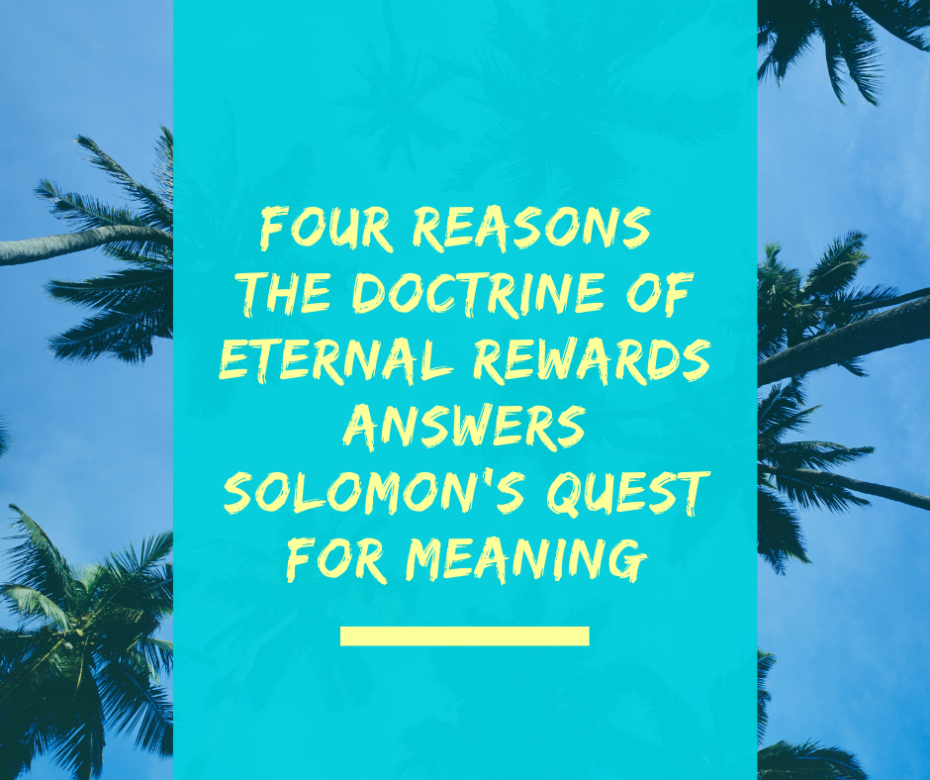The teacher in Ecclesiastes—who was most likely King Solomon—was on a search for the meaning of life “under the sun.” However, all his attempts to find meaning failed. He looked for purpose through pursuing wisdom (Eccl 1:12-14, 18), pleasure (Eccl 2:10-11), legacy (Eccl 2:18-20), wealth (Eccl 5:10-11), even children (Eccl 6:3-4)—among other things—and concluded all labor under the sun was “vanity” or “meaningless” (Eccl 1:1-3; 12:8). Why? Because none of his desires could be satisfied (Eccl 1:8); nothing he could do made a difference to the world, which just kept on going eternally, as if humanity didn’t exist (Eccl 1:4, 9); nothing he would do would be remembered (Eccl 2:16), and finally, anything he could accomplish would end with death (Eccl 9:2-3). So why bother laboring under the sun? As Solomon put it:
What profit has a man from all his labor
In which he toils under the sun? (Eccl 1:3).
Why work?
It was meaningless.
Or at least, it seemed meaningless…if you evaluated things from a merely human perspective.
That’s the key to Ecclesiastes. It is a reductio ad absurdum for a merely earthly point of view. As the rest of the Bible teaches—there is a reality above and beyond the sun. And that is the answer to Solomon’s question—our longing for eternity can only be answered by eternity (Eccl 3:11). More specifically, I want to suggest that the Biblical doctrine of eternal rewards, especially the reward of ruling with Christ, answers Solomon’s quest for meaning.
Too few churches teach that eternal life is a free gift, given through faith, apart from works (cf. John 3:16; Gal 2:16; Eph 2:8-9), and even fewer teach that Jesus will also reward believers based on their faithfulness, endurance, overcoming, and works (cf. Luke 19:17; 2 Tim 2:12; Rev 3:21; 22:12). But eternal rewards are the answer to Solomon’s pessimism! Consider four facts about eternal rewards which show that laboring under the sun is worthwhile:
- Every good deed you do—down to giving a single cup of water—will be remembered (Matt 10:42). Yes, in history, people will forget what you’ve done. But in eternity, God does not. On the contrary, everything you have done, whether good or bad, will be remembered and rewarded accordingly at the judgment seat of Christ (1 Cor 3:11-15).
- Your rewards will outlast the present earth (Rev 21:1). Solomon thought that the generations come and go but that the earth was eternal (Eccl 1:4). But the earth only seems that way from the limited perspective of being “under the sun.” On the contrary, from a divine perspective, the present earth will pass away (2 Pet 3:10), while anyone who believes in Jesus will never perish (John 3:16). And the rewards they receive for their works will be eternal, too (1 Cor 9:25).
- Your rewards will outlast death (Rev 20:6, 14). Contra Ecclesiastes, death is not the end. In fact, there will be an end to death when it is cast into the lake of fire. Believers will be resurrected from the dead and have already passed from death into life (John 5:24; 11:25).
- Your rewards will affect your status in the kingdom into eternity (cf. 1 Cor 9:25; 2 Tim 2:12; Rev 21:24). What you have done may have negligible effects now and may seem futile, but be sure they will have eternal consequences. Your faithfulness now will help determine your position in the kingdom for all eternity.
Solomon asked what profit has a man from his labor done under the sun? If he is a believer, and his labor is good and faithful, the profit is eternal.


